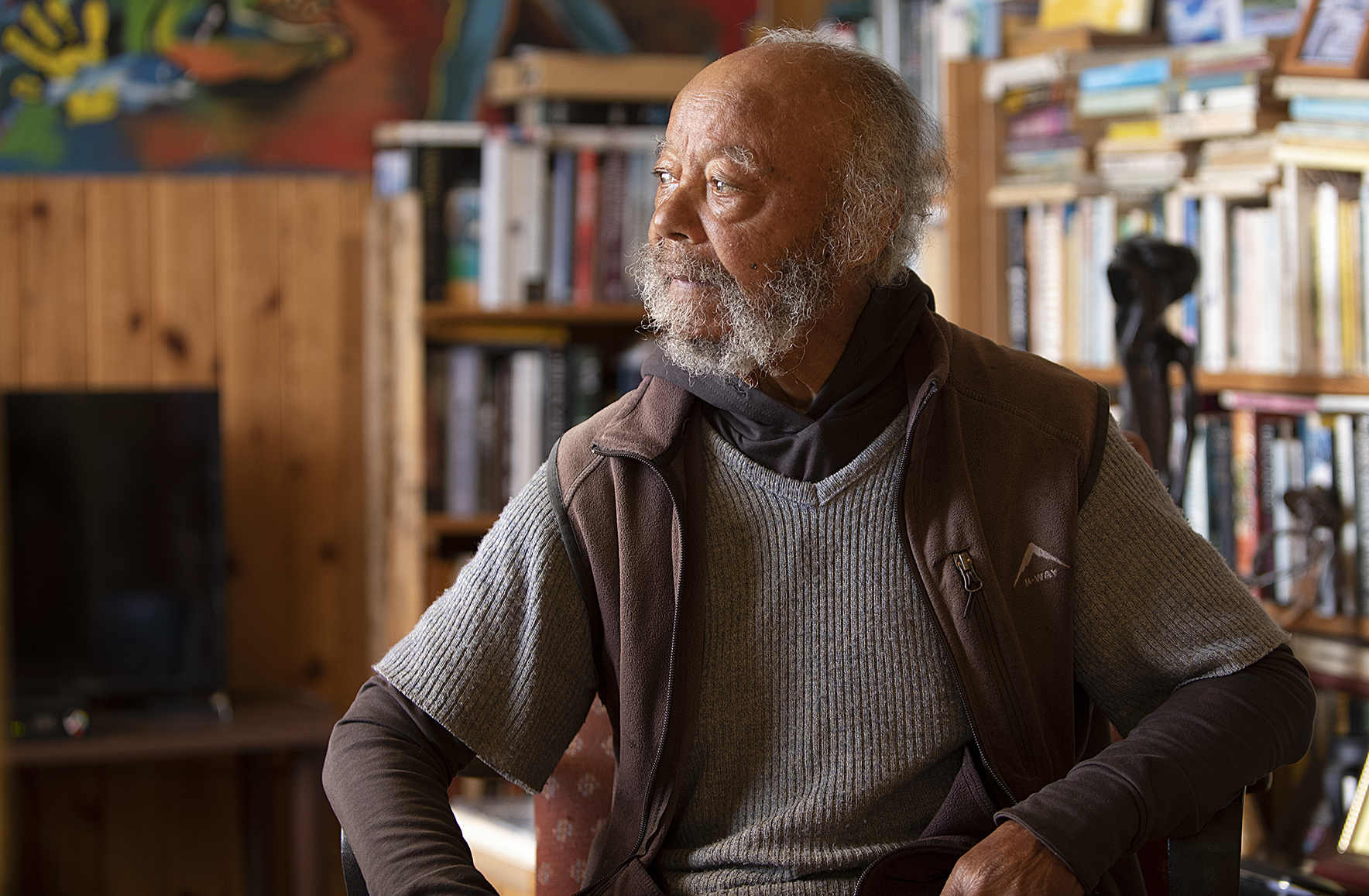James Matthews was not just a writer but a fierce advocate for social change. By the end of the 1960s, his commitment to justice was so strong that he shifted from the short stories he had mastered to the more immediate, raw power of poetry, seeing it as a better tool for activism.
A critic, Thomas Penfold, wrote: “Poetry, he felt, was a form more suitable for rapid and accessible declarations.”
And Matthews said: “Poetry is direct – like the banned Cry Rage – people remember this poem; they tell me it from memory. Younger guys, younger than I, will still recite a verse … now that’s important”.
Matthews’ poetry went on to have a wide impact. By the late seventies, his words – often shared through dog-eared copies of books such as Cry Rage and Pass Me a Meatball, Jones – were standard reading among activists in the Western Cape.
Matthews connected easily with young people in the arts, serving as an inspiration to them. He bonded with the likes of poet Sandile Dikeni, painter Tyrone Appollis and national arts administrators such as Raks Seakhoa and Lebogang Nawa.
His appeal to young people was his irreverence and bohemian bent. Once, at a Congress of SA Writers national conference, I found him sitting outside, sunning himself. “I’d rather be outside. It's a torture chamber in there,” he chuckled, pointing to the hall.
Matthews showed up to support student protests. In 1976, he was part of the Soweto-linked resistance in the Western Cape. In the mid-eighties, he was frequently seen walking along Klipfontein Road, heading to join the youth action in central Athlone, even as casspirs and nyalas moved up and down. He also added his voice and presence to the Fees Must Fall mass actions.
Read more: ‘Uncompromising’ poet and activist James Matthews lived life on his own terms
 James Matthews at home. (Photo: Benny Gool)
James Matthews at home. (Photo: Benny Gool)
Matthews was born in Bo-Kaap in 1929 and ended up living in a small dwelling in Cape Town’s Silvertown. He left school early and felt the pull towards newspapers, initially working as a messenger, clerk and switchboard operator.
“All the working jobs I’ve had, even with being a messenger, was for a newspaper,” he said.
While a messenger at the Cape Times, one of the journalists assisted him with access to a library. This allowed him to take his reading beyond thrillers such as James Hadley Chase.
By 17 years of age, he had his first story in print, in the Sun. In those days, newspapers or magazines were the medium for releasing single stories – and this one appeared in the Sun. He went on to have short stories published in Golden City Post and Cape Times Magazine, Hi-Note and Drum.
For most of his life, the journalism and creative writing tracks ran together. In the words of his daughter, Terry Grove: “He worked as a journalist (his day job), was an activist and wrote at night after he had finished all his daily tasks.”
He entered journalism by the freelance door. At some stage Drum employed him – and by 1955, he was its point person in the Cape. By the late seventies, he was editor of the weekly Muslim News, which he steered as a community rather than a religious newspaper and which was frequently banned.
Matthews’ poetry made its mark and connected him with the bold voices of black consciousness. However, his short story writing period connects him to the Drum writers. He wasn’t one of that group, which boasted a flamboyant writing style that Es’kia Mphahlele described as “racy, agitated, impressionistic … with a nervous energy [and] a caustic wit.”
Rather, he was part of a Cape Town-based writers circle – including Richard Rive, Alex La Guma and Alf Wannenburgh – that Rob Gaylard termed District Six Writers and which Rive called the Quartet group.
Although the Drum writers also spotlighted the effect of apartheid on people’s lives, the Quartet writers took a much stronger stand. For example, his story The Park – about a boy risking a ride on a swing in a “Whites Only” park – and Azikwelwa, set in the 1957 Alexandra bus boycott, took direct aim at the apartheid system.
“I first wrote because of my background; my short stories dealt mainly with poverty,” Matthews said in an interview with Daniel Magaziner.
“I then became more interested in trying to write about the political situation.”
The Drum writers have correctly been widely praised and acknowledged. Matthews’ passing reminds us of the Quartet group’s complementary contribution to short story writing in South Africa.
Matthews, who made a habit of being the outsider, banging on doors, lobbing verbal broadsides and sparring with the establishment, eventually did come in from the cold. In 2004, he received the National Order of Ikhamanga (Silver) and, later, was awarded two honorary doctorates.
In 2022, Matthews was honoured by the Department of Sports Arts and Culture under the Van Toeka Af programme at a special recognition event in Cape Town. And, at his death, the Presidency issued a statement saluting his “excellent achievements” and mourning the “passing of poet, writer and former political prisoner James Matthews”.
He has also drawn high praise from some in academia (which he shunned). Seasoned academic Hein Willemse declared that “it is hard to think of South African political poetry without the name of James Matthews”.
Professor Robert van Niekerk of Rhodes University holds that “any history book on the struggles of the Cape Flats would be entirely incomplete if it did not acknowledge James Matthews’ role as the major poetic voice of our protest and resistance”. DM
Frank Meintjies has an extensive background in social development and cultural organisations. He holds a PhD in Creative Writing from the University of Pretoria and is an executive member of the National Writers of South Africa.




 James Matthews at home. (Photo: Benny Gool)
James Matthews at home. (Photo: Benny Gool)